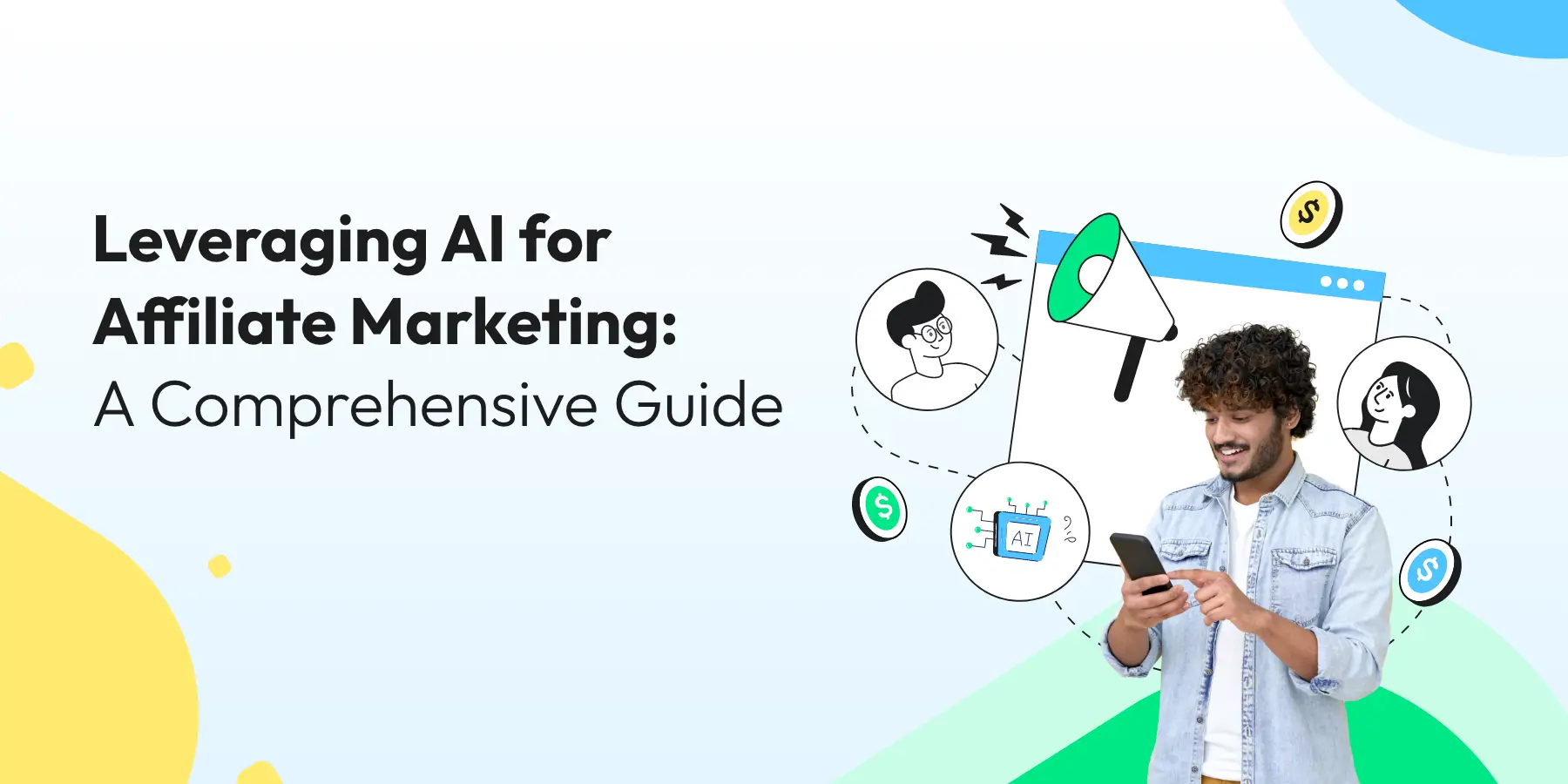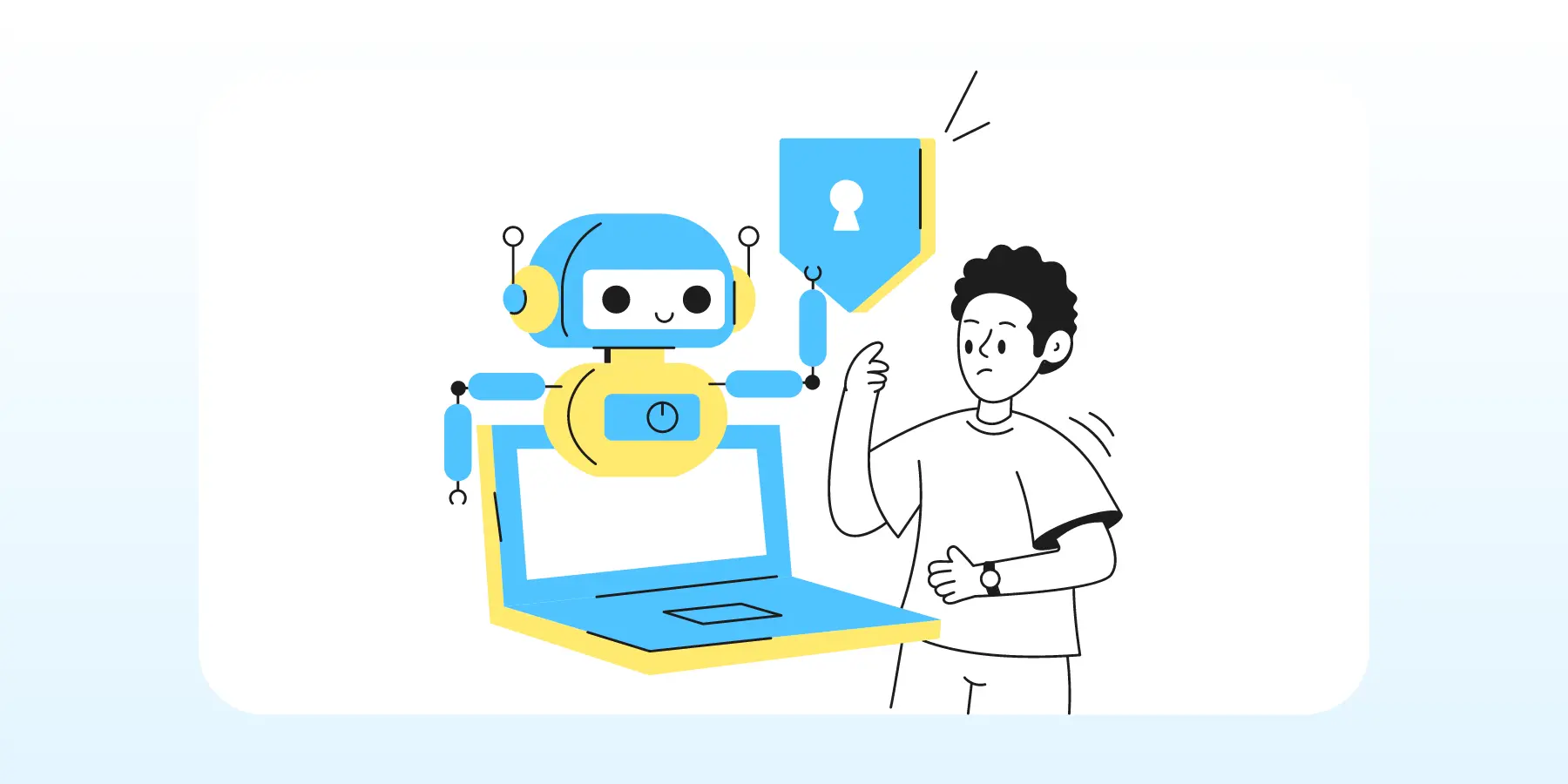
Leveraging AI for Affiliate Marketing: A Comprehensive Guide
Written by: Bharath Bhushan | on: September 25, 2024 | Last updated on: January 15, 2025 | According to: Editorial Policies
Introduction
The world of affiliate marketing is constantly evolving, and with the introduction of Artificial Intelligence (AI), it has taken a revolutionary leap forward. AI affiliate marketing presents an exciting opportunity for marketers to enhance their strategies, streamline processes, and maximize earnings.
By leveraging AI’s capabilities, marketers can automate repetitive tasks, gain valuable insights from data, and personalize customer experiences. This comprehensive guide will explore how AI is transforming affiliate marketing and how you can harness its power for increased success
The integration of Artificial Intelligence (AI) into various sectors is rapidly transforming the way businesses operate, and affiliate marketing is no exception. Understanding the role AI plays in this field is crucial for affiliates looking to enhance their strategies and maximize their earnings.
What is AI in Affiliate Marketing?
AI in affiliate marketing refers to the use of artificial intelligence technologies to enhance various aspects of affiliate strategies. This includes leveraging machine learning algorithms, predictive analytics, and automation tools to optimize marketing efforts.
AI technologies can sift through vast amounts of data to identify patterns, predict trends, and make decisions that would typically require human intervention. These technologies are designed to automate complex tasks, provide valuable insights, and ultimately streamline operations, thus enabling marketers to focus more on strategic planning.

In affiliate marketing, AI is used to track and analyze consumer behaviour, optimize ad placements, and generate personalized marketing content. All these applications aim to increase efficiency and improve the return on investment (ROI) for businesses.
By deploying AI tools, marketers can target the right audience with the right message at the right time, thereby increasing the likelihood of conversions and enhancing the overall effectiveness of affiliate campaigns.
How AI is Revolutionizing Affiliate Marketing
AI is revolutionizing affiliate marketing by introducing intelligent automation and data-driven optimization to the industry. Here are some ways AI is redefining the landscape:
- Predictive Analytics: AI tools can analyze historical data to forecast trends and consumer behaviours, which help affiliates make informed decisions regarding product promotion and marketing strategies.
- Automation of Repetitive Tasks: Administrative tasks such as data entry, report generation, and email marketing can be automated, freeing up time for marketers to focus on more strategic activities.
- Improved ROI Tracking: AI algorithms can accurately track and report on marketing performance metrics, allowing affiliates to quickly adjust their strategies to maximize returns.
- Audience Insights: By analyzing customer data, AI provides detailed insights into customer preferences, purchase behavior, and interaction patterns, which can be used to tailor marketing approaches effectively.
- Statistical Modeling: AI models can accurately assess the probability of conversion for potential leads, enabling marketers to prioritize high-value targets.

As AI continues to evolve, its potential to transform affiliate marketing into a more efficient and profitable enterprise only grows. Affiliates who harness the power of AI stand to gain a strategic advantage in an increasingly competitive marketplace.
Read more about WhatsApp AI Integration: What, Why and How
The Benefits of Using AI for Affiliate Marketing
Adopting AI technology in affiliate marketing is not just about keeping up with the latest trends; it offers tangible benefits that can significantly enhance marketing efforts. From better data analysis to automated processes, AI provides a robust framework for improving marketing performance.
1. Enhanced Data Analysis and Insights
One of the most significant benefits AI offers to affiliate marketers is the ability to analyze vast amounts of data quickly and accurately. Traditional data analysis methods can be time-consuming and prone to errors.

However, AI technologies streamline this process by using advanced algorithms to extract meaningful insights. Here are some advantages:
- Real-time Data Processing: AI can process data in real-time, enabling affiliates to gain immediate insights and make quick adjustments to their strategies.
- Pattern Recognition: AI tools can recognize complex patterns and relationships in data that might be missed by conventional analysis, offering deeper understanding of market trends.
- Customer Segmentation: By analyzing customer behavior data, AI can help segment the audience into groups with similar characteristics, improving targeting efficiency.
Enhanced data analysis not only improves campaign effectiveness but also results in a better understanding of customer needs and preferences, paving the way for more successful marketing initiatives.
2. Automated Customer Targeting
AI enables more precise customer targeting through automation. By automating the process of identifying potential customers, marketers can ensure that their message reaches the right audience without wasting time or resources. Some benefits include:
- Behavioral Analysis: AI systems can analyze user behavior patterns to identify prospects most likely to convert.
- Optimized Ad Placement: Using AI, marketers can determine the best platforms and times to display their ads, maximizing visibility and engagement.
- Dynamic Retargeting: AI can automatically retarget ads to users who have shown prior interest, maintaining engagement and encouraging conversions.
- Lookalike Audiences: AI can identify audiences with behaviors and characteristics similar to existing customers, expanding the reach effectively.
Through automated customer targeting, businesses can enhance efficiency, reduce ad spend wastage, and improve campaign outcomes by engaging only those who are most likely to respond positively.
Check out Automating Order Confirmations and Shipping Updates with WhatsApp
3. Improved Content Personalization
AI’s ability to personalize content is one of its most powerful attributes in affiliate marketing. Personalization is key to engaging today’s consumers, who expect marketing messages to be relevant and tailored to their needs. AI facilitates this through:
- Content Recommendations: AI systems can recommend content that aligns with a user’s past behaviors and interests, creating a personalized experience.
- Adaptive Messaging: AI allows the creation of dynamic marketing messages that change according to user interaction, ensuring content remains relevant.
- Customized User Journeys: By analyzing how users interact on the site, AI can tailor their journey, offering them content they are more likely to engage with.
- Optimized Landing Pages: Using AI, marketers can develop landing pages customized for different audience segments, improving engagement and conversion rates.
The enhanced ability to personalize content not only boosts engagement but also increases conversion rates by providing users with information that matters to them at the right time.
Through improved data analysis, automated targeting, and personalized content, AI empowers marketers to enhance efficiency and effectiveness, paving the way for increased affiliate earnings and a stronger competitive position in the marketplace.
As AI technology continues to advance, its role in affiliate marketing is set to expand, offering even greater opportunities for innovation and growth.

Tools and Technologies for AI-Driven Affiliate Marketing

Artificial intelligence continues to revolutionize countless industries, and affiliate marketing is no exception. AI-driven tools and technologies can significantly enhance marketing efforts, streamline processes, and maximize earnings. Understanding the available tools is crucial for any marketer looking to stay ahead of the curve.
Here’s a closer look at some of the key AI-powered technologies reshaping affiliate marketing.
1. AI-Enabled Analytics Platforms
AI-enabled analytics platforms are game-changers for affiliate marketers. They provide detailed insights and data-driven recommendations that empower marketers to make strategic decisions. These platforms can analyze vast amounts of data quickly, identifying patterns and trends that the human eye might miss.
- Predictive Analytics: By leveraging AI, predictive analytics platforms can forecast potential outcomes based on historical data. For affiliate marketers, this means being able to predict which products or services are likely to perform well, enabling them to focus their efforts more effectively.
- Consumer Behavior Analysis: AI-enabled platforms can map consumer journeys and track behavior in real-time. This allows marketers to understand how consumers interact with their products, identifying what drives conversions and optimizing campaigns accordingly.
- Performance Tracking: These platforms offer comprehensive performance tracking, giving marketers insight into clicks, views, conversions, and more. This data is crucial for assessing the success of various campaigns and making necessary adjustments to improve outcomes.
2. Machine Learning Algorithms in Marketing
Machine learning algorithms form the backbone of AI by continuously learning from data and improving over time. In affiliate marketing, these algorithms can optimize various aspects to enhance efficiency and effectiveness.

- Content Optimization: Machine learning can analyze which types of content resonate best with audiences and suggest improvements. This could involve tweaking headlines, choosing the best images, or adjusting call-to-action phrases to boost engagement and conversions.
- Target Audience Segmentation: By studying patterns in user data, machine learning algorithms can segment target audiences more precisely. This ensures that marketing messages reach the right people at the right time, increasing the likelihood of conversion.
- Dynamic Pricing Models: AI-driven algorithms can help develop dynamic pricing models that adjust prices in real-time based on demand, competition, and user behavior. This can effectively increase sales and maximize affiliate earnings.
3. Chatbots and Virtual Assistants
AI-powered chatbots and virtual assistants are becoming increasingly integral to customer interactions in affiliate marketing. These tools can handle a wide range of tasks, improving customer service and engagement.
- 24/7 Customer Support: Chatbots can provide instant responses to customer inquiries, offering support any time of the day. This round-the-clock availability can enhance customer satisfaction and trust, leading to higher conversion rates.
- Personalized Recommendations: By analyzing customer data, chatbots can make product recommendations tailored to individual preferences and past behavior. Personalized shopping experiences can significantly boost sales and affiliate earnings.
- Lead Generation and Nurturing: Chatbots can engage potential leads in conversation, collect information, and funnel them through the sales pipeline. This automation helps in nurturing leads until they’re ready to convert, saving time and resources for marketers.
Check out Chatbots and Affiliate Marketing: The Key to Passive Income
Implementing AI Strategies in Affiliate Marketing
Understanding the available AI tools is only the beginning. Successfully integrating AI strategies into your affiliate marketing efforts requires careful planning and execution. Here’s how you can strategically implement AI in your marketing endeavors.
1. Identifying Key Performance Indicators (KPIs)
The first step in implementing AI in affiliate marketing is to identify the right KPIs that align with your business goals. Clear KPIs will guide your efforts and allow you to measure success effectively.

- Conversion Rate: This is perhaps the most crucial metric, indicating the percentage of visitors who complete a desired action. AI tools can help optimize conversion rates by analyzing customer journeys and identifying friction points.
- Customer Lifetime Value (CLV): CLV measures the total revenue a customer is expected to generate during their relationship with your business. AI analytics can help identify customers with the highest potential CLV, allowing you to tailor your marketing strategies accordingly.
- Return on Investment (ROI): AI tools can optimize ROI by pinpointing the most effective channels and strategies, reducing wasteful spending and enhancing profitable avenues.
Read more about The 8 Most Essential Affiliate Marketing KPIs You Should Be Tracking
2. Choosing the Right AI Tools for Your Needs
Not all AI tools are created equal, and what works for one marketer may not work for another. Choosing the right tools involves considering your specific needs and budget.
- Scalability: Ensure the AI solution you choose can grow with your business. A good tool should be able to handle increasing data loads and offer additional features as your business expands.
- Ease of Integration: Look for tools that can seamlessly integrate with your existing systems and processes. This will minimize disruptions and enable faster implementation of AI strategies.
- User-Friendliness: AI tools should be intuitive and easy to use. A complicated interface can lead to a steep learning curve, delaying the benefits of implementing AI.
3. Integrating AI with Existing Marketing Systems
Integration is key to leveraging AI’s full potential. AI tools should complement rather than replace your existing systems, working in tandem to deliver enhanced results.
- Data Synchronization: Ensure that your AI tools can sync with your current databases and CRM systems. This harmonious integration will provide a comprehensive view of your marketing efforts, enabling more accurate analysis and decision-making.
- Cross-Platform Compatibility: AI tools should be compatible across multiple platforms, from social media to email marketing. This ensures consistent application of AI strategies across various channels, providing uniform results.
- Collaboration with Teams: AI integration should also facilitate collaboration between different teams. By providing real-time insights and automated reports, AI tools can help ensure that all team members are aligned and informed, streamlining workflows and boosting productivity.
Leveraging AI for affiliate marketing can significantly enhance your strategies, offering cutting-edge analytics, automation, and insights. By understanding these tools and technologies, and implementing them strategically, marketers can optimize their campaigns, improve customer engagement, and ultimately increase affiliate earnings.
As AI continues to evolve, staying informed and adaptable will be key to sustaining success in the competitive landscape of affiliate marketing.
Challenges and Considerations
1. Ethical Concerns in AI Usage
When implementing AI in affiliate marketing, ethical considerations are paramount. AI systems often collect vast amounts of data to function effectively. This data must be handled responsibly to protect consumer privacy. Marketers must ensure compliance with data protection regulations such as the General Data Protection Regulation (GDPR) in Europe or the California Consumer Privacy Act (CCPA) in the United States.
There is also the concern of AI algorithms inadvertently perpetuating biases. If not correctly managed, AI can reflect and even amplify biases present in its training data, leading to unfair targeting or the exclusion of certain groups from marketing efforts. To address this, marketers must ensure their AI systems are transparent and regularly audited for bias, helping build consumer trust and maintaining ethical standards.
Moreover, transparency with consumers about how their data is used is crucial. Providing clear, straightforward information on data usage policies can mitigate potential backlash and maintain a positive reputation for brands using AI in affiliate marketing.
2. Balancing Automation with Human Touch
While AI is immensely powerful in automating repetitive and data-driven tasks, maintaining a human touch is essential in affiliate marketing. Consumers value personalization and genuine interactions, aspects that machines cannot fully replicate. Thus, a balance between human creativity and AI efficiency is crucial.

- Content Creation: AI tools can generate basic content, but human marketers provide creativity and nuanced insights that capture audience emotions and engage them effectively.
- Customer Interaction: AI chatbots handle routine inquiries, but complex or sensitive customer interactions are best managed by humans to ensure empathy and understanding.
- Strategy Development: While AI analyzes data trends and provides insights, human marketers devise long-term strategies and make intuitive decisions that machines may overlook.
By integrating AI tools to handle analytical tasks while preserving human creativity and empathy in strategic areas, affiliate marketers can optimize their approach and enhance consumer satisfaction.
3. Staying Updated with Technological Advances
The landscape of AI and its applications in affiliate marketing are continuously evolving. Keeping pace with technological advancements is critical for marketers to maintain a competitive edge. Regular research and training are necessary to understand new AI tools and platforms that could enhance marketing efforts.
- Training and Development: Marketers should participate in workshops and courses to stay informed about the latest AI technologies. This education enables them to leverage cutting-edge tools effectively while making informed decisions about adopting new technologies.
- Networking and Collaboration: Engaging with peers and industry experts in AI forums or at conferences can provide valuable insights and foster innovation. Collaboration could lead to discovering new strategies and solutions that might not have been evident through independent efforts.
- Monitoring AI Trends: Keeping an eye on AI trends involves following industry news, subscribing to relevant publications, and participating in webinars. This commitment helps marketers anticipate shifts and adapt their strategies, ensuring they remain at the forefront of technological adoption in affiliate marketing.
Future Trends in AI and Affiliate Marketing

AI is driving transformative trends in affiliate marketing, reshaping how marketers engage consumers and optimize strategies.
- Increased Personalization: AI will refine personalized marketing by offering hyper-targeted content and offers, based on advanced algorithms that deeply analyze consumer behavior.
- Voice and Visual Search: The growing use of voice assistants and visual search will require marketers to adapt. AI’s ability to understand natural language and images will allow for optimized content and broader audience reach.
- AI-Powered Predictive Analytics: Predictive analytics will become more sophisticated, enabling marketers to foresee trends, proactively address consumer preferences, and improve ROI by tailoring their strategies.
- Blockchain and AI Integration: Integrating blockchain with AI will enhance transparency and trust in affiliate marketing by ensuring secure data handling and boosting consumer confidence.
- Hyper-Automation: AI will drive hyper-automation, handling complex tasks and allowing marketers to focus on high-level strategies, improving productivity and decision-making.
- AI in Influencer Marketing: AI will enhance influencer marketing by identifying authentic influencers, analyzing engagement, and optimizing brand partnerships for better campaign results.
These innovations signify a new era in affiliate marketing, offering greater efficiency, personalized engagement, and higher earnings potential for marketers who embrace AI.
Conclusion
Incorporating AI into your affiliate marketing strategy can significantly enhance your earnings and streamline your processes. By leveraging AI tools for data analysis, customer engagement, and task automation, you can optimize your marketing efforts with increased efficiency and precision. Not only does this technology help in personalizing content and predicting trends, but it also allows you to focus on strategic growth rather than routine activities.
Ultimately, embracing AI will position you ahead of the competition as you capitalize on the evolving landscape of digital marketing. Stay updated on AI advancements to refine strategies and maximize success in affiliate marketing.
FAQ’s
1. What are the key benefits of using AI in marketing?
AI enhances marketing by providing predictive analytics, automating repetitive tasks, improving ROI tracking, and delivering personalized customer experiences.
2. How can AI help in automating customer targeting?
AI uses behavioral analysis, dynamic retargeting, and lookalike audience generation to precisely target potential customers, maximizing engagement and conversions.
3. Can AI optimize content for better affiliate marketing results?
AI tools personalize content, adapt messaging in real-time, and optimize landing pages, boosting engagement and conversions.
4. Is AI capable of analyzing consumer behavior in real-time?
AI-driven platforms can track and analyze consumer behavior in real-time, providing actionable insights for improving campaign performance and targeting.
5. What ethical concerns should I consider when using AI in affiliate marketing?
Ethical considerations include data privacy, bias in AI algorithms, and transparency with consumers about how their data is being used.
6.Which AI tools are most useful for affiliate marketers?
Key AI tools for affiliate marketers include analytics platforms, machine learning for content optimization, and AI-powered chatbots.




Latest Comments